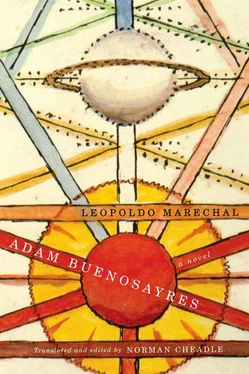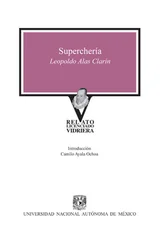— I’m the hindmost harmony of a race soon to disappear…
— Where? I asked him, disheartened.
— LY2, Radio Home-on-the-Range, he answered. Every night from 8 to 8:15.
The wind whisked him away, guitar and all. At this point, Prince Charming, the Mack, the guitarist of Montmartre, the trio of Bohemians, and other homoplumes of similar ilk all came crowding back, apparently with some aggression in mind, judging by their insolent voices and belligerent attitudes. Fortunately, the sound of a xylophone reduced them to silence. Next we heard the nasal voice of a radio announcer:
— ZZ1, Radio Inferno. A very pleasant evening to you all, dear listeners. And it will be pleasant indeed, I assure you, if you have all heeded the wise counsel of prudence and shaved using the unbeatable Styx-brand razor-blade, the only one that’s as as soft on your chin as the caress of a sylph. Before we begin tonight’s program, allow me a brief philosophical digression, which by activating the not always well-exercised cells in your grey matter, may at this hour perturb the respectable working of your no less respectable small intestine. But fear not, dear listeners, for in the case of an internal revolution you will always have on hand the infallible Marathon, the world’s fastest and gentlest laxative.
Another stroke of the xylophone whetted our sense of expectation, and the announcer lifted his voice again:
— Rare is the mortal, he began, who does not revere Radio Broadcasting as among the scientific miracles of today, the one that has most exalted the faith of true believers in a future full of admirable artifacts which, furnishing their houses and unfurnishing their souls, will surely give access to a realm of headache-free bliss. Do you acknowledge this, dear listeners? Celebrate it, then, with a glass of famous Alembic-brand cognac, a masterpiece of contemporary alchemy! But if science has wrought a great miracle in Radio, no less miraculous is the feat that Radio itself has produced in this century, by populating the once silent ether with the crippled voices, whole-cloth grunts, musical belches, confused oratory, and artistic flatulence of a multitude whose lyrical talents had never crossed — alas! — the narrow limits of the family, and which today, thanks to H.M. the Microphone, surge forth from an age-old and unjust anonymity. And so in today’s world, there isn’t a dime-store guitar-picker, neighbourhood soprano, milk-bar playwright, gazebo poet, amateur actor, or home-body declaimer who doesn’t abandon the shameful shovel, the degrading hammer, the servile needle-and-thread, the vulgar scaffolding, in order to rush off to the broadcasting sessions, anxious to let their voices chime into the great universal chord. Our program will faithfully transmit their innovative harmonies. Listen attentively, dear listeners. And just remember: brands of toilet soap may abound, but none equals the exquisite Munda-totum, capable of giving your skin a second, eternal, adolescence.
The announcer stopped talking. Three strokes on the xylophone pierced the silence. And right away, as if cued by those notes, the homoplumes struck up the most abominable concert ever heard by human ears: tango orchestras bleating, strident riffs of jazz, crooners bawling, flowery cabaret songs, radio-drama clichés such as “Kill her!” and “Ah, I’m dying!”, newscasters foaming at the mouth, play-by-play commentary of soccer games and boxing matches, commercials insistent as horseflies and mindless as an idiot’s refrain. All these voices and many more erupted at once and mingled in such a dreadful din that Schultz and I took off at a desperate run, knocking aside homoplumes as they strummed or shouted like maniacs.
Thus, at full speed, we left that sector. Still running, we crossed the zone of silent homofolias ; for a few minutes they rained down on us like dead leaves torn from trees by autumn winds. The urgent desire to reach open space and our furious speed in flight prevented me from getting a sense of the homofolias ’ character. However, the lethargy of those infernal entities, their indolent gliding fall, and above all their absolute muteness led me to guess that they were of that well-known species of criollo — “those born tired.”
We stopped at the edge of an area in the middle of which was a merry-go-round (or calesita , as we call it in Argentina). Fitted with something like sails, the carousel span either slowly or vertiginously, according to the fluctuations of the wind. As it turned, it produced a kind of hurdy-gurdy music, its rhythm frantically speeding up or slowing to a crawl in tandem with the speed of rotation. Listening to the nasal strains, I was quite surprised to recognize the Gregorian Dies Irae . 97A concourse of grave men — their solemnity striking me as rather at odds with the infantile pastime — had filled the merry-go-round and were rotating with it. In groups of two or three, they rode ugly animals made of painted wood; among them, I picked out the Dragon of the Apocalypse, the Seven-Headed Beast, the Two-Horned Beast, the Great Whore, and the kings of Gog and Magog. 98These solemn men, castigating the flanks of their monstrous mounts with their brass spurs, did so with a will that seemed quite meritorious, I must say; and so did the way they eagerly strove to grasp a glittering ring nailed to a stick, which a demonic operator disguised as an angel was offering and denying to their outstretched hands. 99I was taking a good look at the calesita , still not guessing what meaning it carried in the hell of Sloth, when one of the solemn men, on the point of seizing the ring, lost his balance and fell off the revolving machine. 100Schultz and I ran over, helped him up to his feet, and with the best intentions began brushing the sand off his clothes. But, with dignity, the man broke free of our hands:
— Noli me tangere , 101he warned in an utterly passionless voice.
I felt confused. But the astrologer Schultz laughed benevolently:
— Of course! he said. This is the Grand Orisonist!
Difficult indeed to depict the rage that possessed the man when he heard those words. He stammered for a moment, spit out the sand still in his mouth, and shouted:
— The Vice-Pope is a clown! To Gehenna with him! If he’s blasphemed once, he’s done it a thousand times!
— No doubt about it, Schultz reaffirmed. We have before us the Grand Orisonist.
Then the astrologer turned and spoke to me in particular:
— You should know that a few years ago a new heresy began to spread its deleterious miasma in the very Catholic city of Buenos Aires. A handful of men, prey to a fanaticism not entirely devoid of grace, fell into the pious folly of clinging tooth-and-nail to prayer (which is praiseworthy) and refusing all forms of action to the point of becoming terrestrially immobile. This condition of stasis, however, did not stop them from consuming tea and biscuits in alarming quantities, or prodigiously climbing the ranks in their public service careers, or satirizing those foolish mortals who squandered their time on useless philosophical speculation, vain artistic efforts, and prosaic attempts to reorganize the earthly city. 102And this came to pass in the year of the Great Flood, when the last white herons appeared in the south.
— I deny the bit about the biscuits! interrupted the grave man at this point. The Vice-Pope’s pointed ears are clearly sticking out from behind this malignant tale!
Paying him no attention, Schultz continued:
— That’s how things stood when there appeared a man in whom the prudence of the serpent was wed to the candour of the dove. He saw that doctrinal folly as a final offshoot of the old and apparently exhausted heresy known as Quietism . 103Then he gave it the name of Orisonism , and those who yielded to such a dangerous tendency came be known as Orisonists. That strange apostle (who surely came straight out of the desert, having subsisted there on locusts and wild honey) claimed for himself the title of Vice-Pope — “the Vice” for short, obviously. 104
Читать дальше












